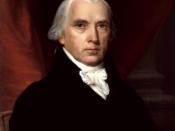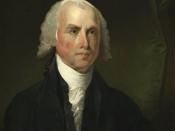In the Federalist Papers, James Madison and Thomas Jefferson discuss the issue of constitutional conflict, specifically the encroachment by any one branch of the government on another. Jefferson proposes a method for resolving such a conflict between the Judicial, the Legislative, and/or the Executive branch of government. His proposal states that ``whenever any two of the three branches of government shall concur in opinion, each by the voices of two thirds of their whole number, that a convention is necessary for altering the constitution, or correcting breaches of it, a convention shall be called for the purpose" (Madison, No. 49 310).
Jefferson has two reasons for making such a proposal. First, no one department can ever be a judge in such a constitutional conflict, because none of them "can pretend to [have] an exclusive or superior right of settling the boundaries between their respective powers" (Madison, No. 49 311).
Secondly, appealing to the people to resolve constitutional conflicts is a reasonable course of action, since our republican form of government derives its power and legitimacy from the people. Who better to be the judge the central government, than the highest power in the land, the people? Therefore, without resorting to a convention made-up of the people, such encroachments could never be deterred nor redressed. Only they have right or ability to pass judgment and enforce their ruling.
Madison strongly objects to Jefferson's proposal. One such objection concerns the effects repeated appeals would have on public's overall opinion of the government. The concern is that by frequently displaying the faults, conflicts, corruption, helplessness, and ineffectiveness in government, the people would no longer trust and respect their government. An opinion held in private and isolated from society is powerless and poses little or no danger to the established authority. However, such...


